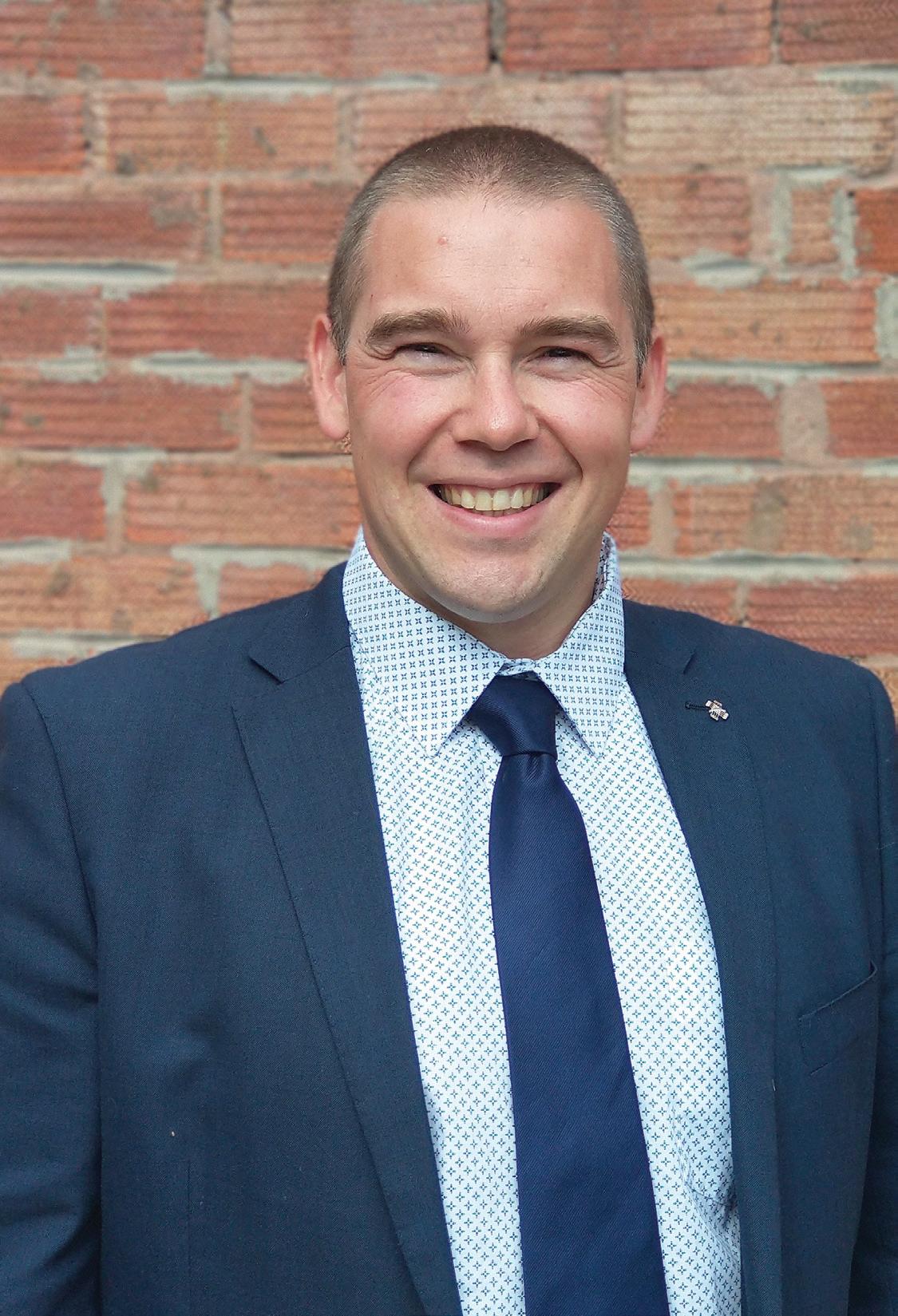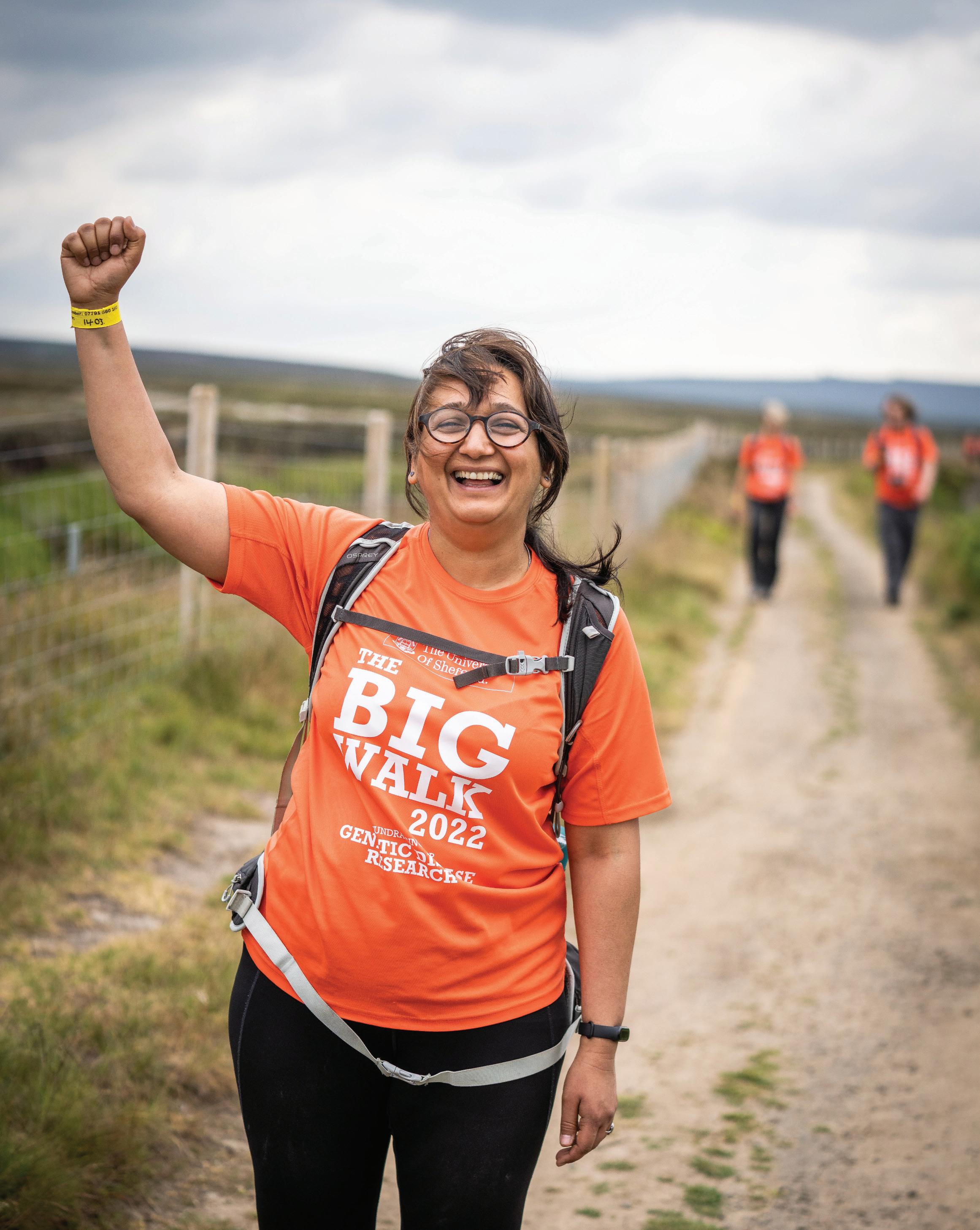

Welcome to the latest edition of Your Gift.
Firstly, thank you. Thank you for everything you have personally done to support the University of Sheffield over the past 12 months. I am incredibly grateful.
Without your generous support, the projects and stories you are about to read would not have been possible. Donors, volunteers, and fundraisers make up Sheffield’s diverse supporter community, and I admire everything you do.
As you will know, the cost of living crisis is affecting our students. Your support is making a huge difference to them. This year, almost a quarter of new home students join us from a widening access background. Thanks to your generosity, we have awarded 322 students with scholarships to support their living expenses. I know that this means the world to them, so thank you for being by their side as they pursue their education.
To those of you who have volunteered your time and shared advice with our students, I want to express my gratitude. Our alumni volunteers are fantastic role models for our students. When they hear about your experiences and success in your varied professions, the prospect of building a career after graduation becomes less daunting.
This year saw the welcome return of the Big Walk, our flagship fundraising event. The hundreds of walkers who took on this challenge in aid of our Genetic Disease Research showed what can be achieved when we join forces.
I would also like to highlight the compassion of those helping our friends from Ukraine. This year, £250,000 of philanthropic contributions have supported sanctuary scholarships for those fleeing war or persecution. Three Ukrainian students have joined us this year as part of the scheme. We have also welcomed other students from Ukraine, who have transferred to Sheffield to continue their studies.
No matter how you choose to support such worthy causes, one thing is certain - your kindness is the real gift. By championing education, fairness and opportunity, you continue to reinforce these values within and amongst our community.
Thank you so much.
Professor Koen Lamberts President and Vice-Chancellor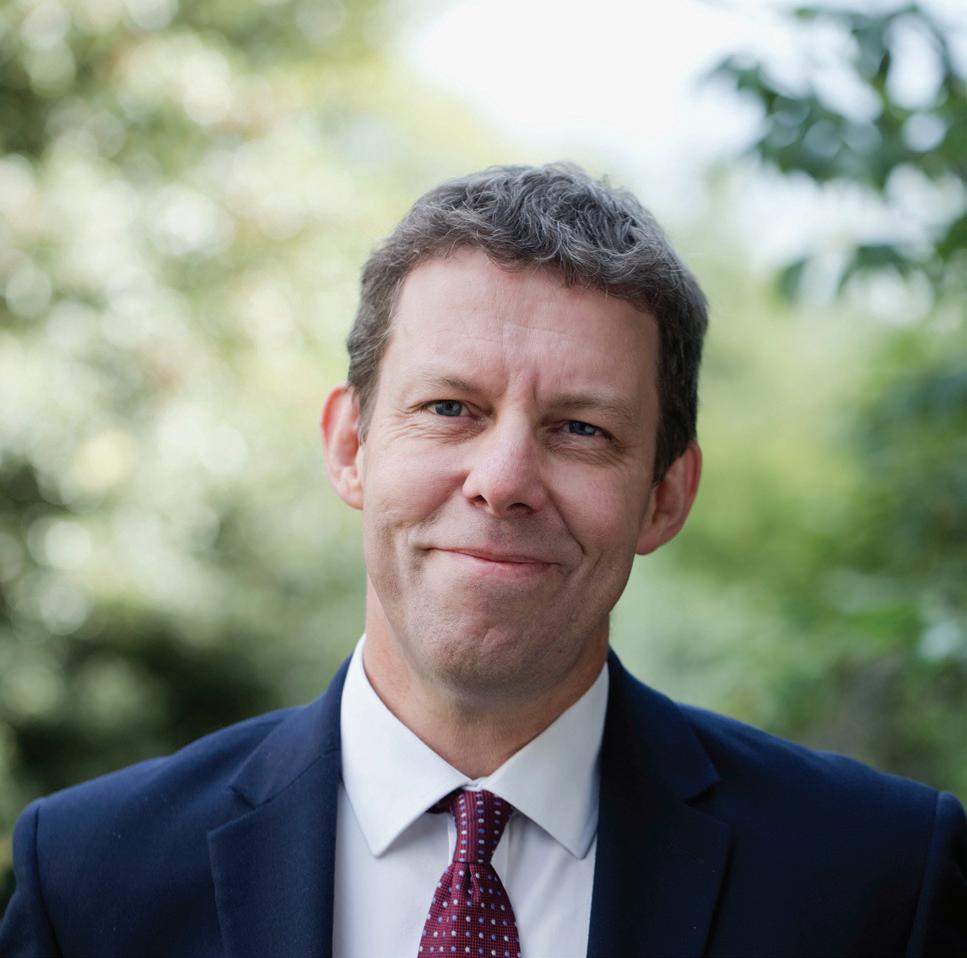 Professor Koen Lamberts, President and Vice-Chancellor of The University of Sheffield
Professor Koen Lamberts, President and Vice-Chancellor of The University of Sheffield
Your Support Matters
The past year has seen students face continuing and new challenges. But thanks to your commitment to creating a fair and more inclusive University of Sheffield, our students are hopeful for the future.
As this year’s President of the Students’ Union, and on behalf of the whole student body, I want to thank you for the kindness and generosity you’ve shown.
Thanks to your contributions as donors, hundreds of students are currently studying at Sheffield thanks to life-changing scholarships and hardship grants.
And for those of you who volunteer to mentor and support student employability, your time and advice is invaluable.
A thank you from across the pond
A message of thanks from Sheffield in America’s new Chair of the Board, Chris Cheetham.
Since 2004, the University of Sheffield in America has been a galvanising force in bringing together Sheffield alumni from across the United States. This year sees some changes to the Board of Directors, as Chairman, Trevor Richards, steps down and I step in.
With more than 4,000 Sheffield graduates living and working in the US, Trevor and his late wife Julie have been instrumental in helping alumni and friends keep in touch. As a registered charity in its own right, the University of Sheffield in America provides US donors with the most tax efficient method of giving. Since Trevor joined the Board in 2009, US alumni have donated more than $18 million in support of scholarships for low-income students, our flagship research institutes and focused campaigns.
With the University of Sheffield in America playing such a significant role in Sheffield’s international
Supporters like you offer a lifeline to students. Without your generosity so many talented students would miss out on the education and university experience they deserve.
Thank you from us all.
Liam Hand Students’ Union President 2022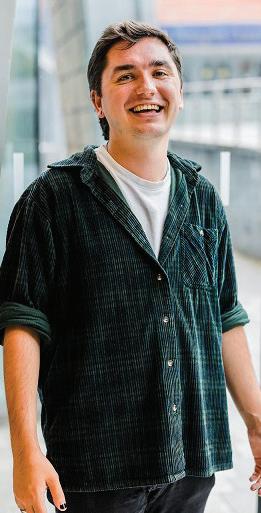
activity, we’d like to publicly thank Trevor and Julie for all they’ve done over the last 14 years. As donors themselves, they’ve championed Sheffield from afar but also returned regularly to campus. Together they took on three separate Big Walks, whilst their volunteering commitments helped host hundreds of guests at many, many events. Their dedication to our University and all it strives to achieve has been exemplary. Thank you Trevor and Julie.
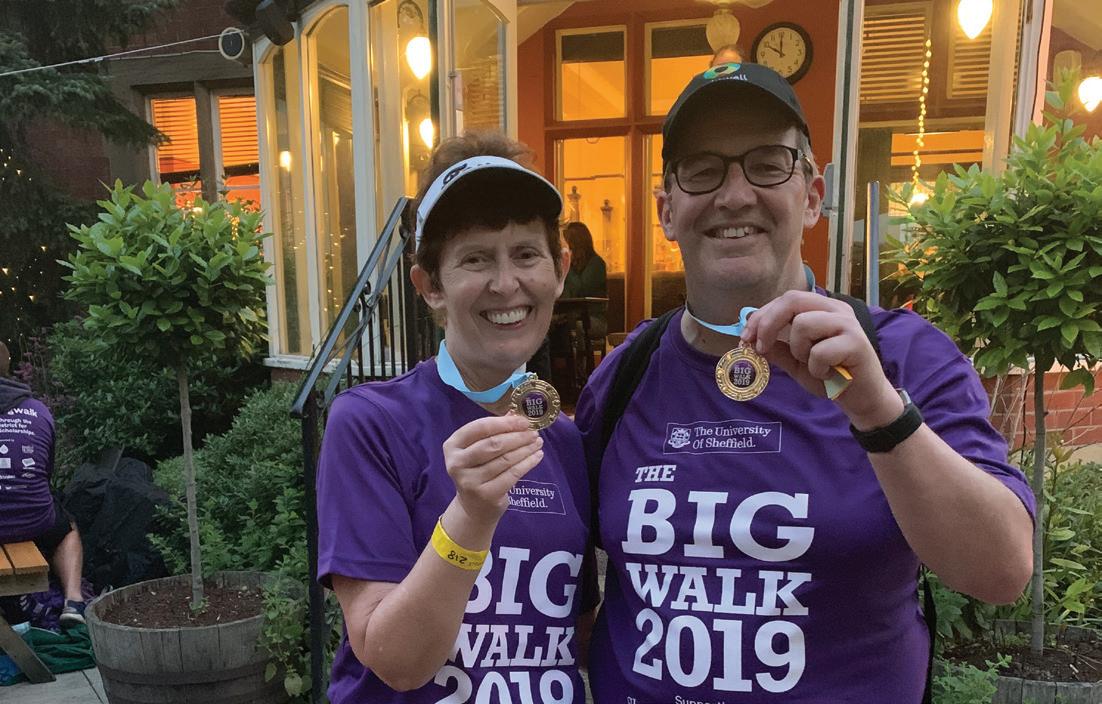
Looking ahead, I’m pleased to see Trevor continue as a member of the Board. I look forward to working with him, our fellow members and many more US alumni. Together we will demonstrate the impact alumni have on the student experience and the development of the South Yorkshire region and beyond.
Cheetham, BA Business Studies & Economics 2002 Chairman, University of Sheffield in AmericaCelebrating your support for Parkinson’s disease research
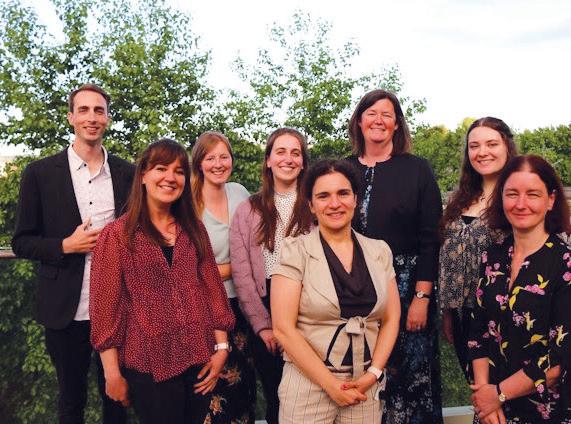
Back in June, over 100 donors, fundraisers and friends visited the Sheffield Institute for Translational Neuroscience (SITraN) to celebrate their incredible support for Parkinson’s disease research. Since 2019, more than a thousand individuals have made kind contributions to help us better understand this disease which still has no cure. Efforts have seen more than half a million pounds raised to find new treatments for this devastating condition.
The occasion marked a welcome return to celebrating in person. Guests received guided tours of the research laboratories,
“Thanks to the generosity of supporters like you, Parkinson’s research goes from strength to strength. Thank you so much. It was lovely to meet so many of you in person.”
Heather Mortiboys, Professor of Cellular Neuroscience and Metabolism and Director of Knowledge Exchange
The future of medicine. Sheffield Made.
August saw construction complete on Sheffield’s brand new Gene Therapy Innovation and Manufacturing Centre (GTIMC). Alongside national and regional funding, the GTIMC was made possible thanks to a £3 million donation from The Law Family Charitable Foundation, established by alumnus Andrew Law and his wife Zoë. With an expected launch early next year, research lead Professor Mimoun Azzouz is on track to make this cutting-edge facility the new home of gene therapy at Sheffield. What’s more, we’re delighted to announce the brand new bioreactor, funded by almost 5,000 donations,
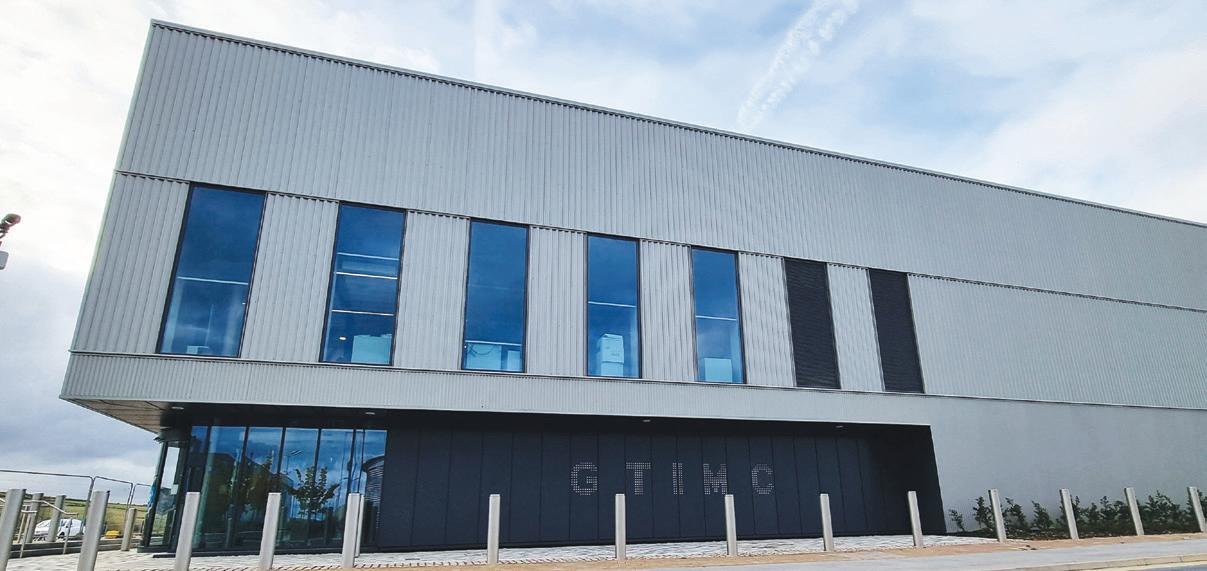
is finally in place. This key piece of equipment will be used by countless researchers and scientists as they progress research into treatments for genetic diseases such as motor neurone disease, SPG47 and COL4A1.
“
Thank you to everyone who’s made a gift or fundraised over the last 12 months. It’s been amazing to see the sheer number of people who have backed this research. I’m very grateful.
Mimoun Azzouz, Professor of Neuroscience and Director of GTIMC
live demonstrations and heard updates from lead researchers, Professors Oliver Bandman and Heather Mortiboys.Investing in student potential
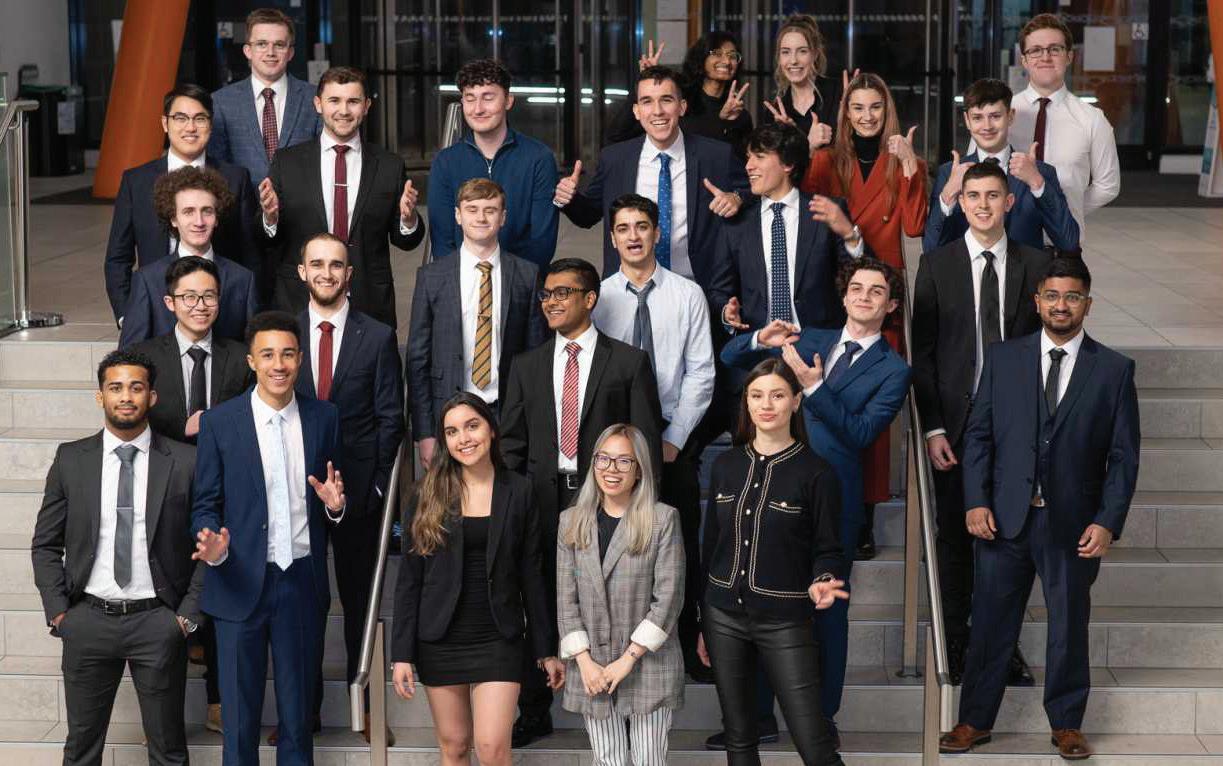
In March, students, staff and alumni from the Department of Finance celebrated 10 years of the Twikker Fund, a student-managed investment group for those building a career in finance. Established back in 2011 by Sheffield alumnus, Steve Kiln, the Twikker Fund has since grown to become one of the most successful student investment initiatives in Europe. Steve’s initial donation of stocks and shares kickstarted the fund, which is now worth more than £200,000. A decade of inspiring and upskilling some of Sheffield’s most promising students is a fantastic achievement.
“There aren’t many examples where someone would be mad enough to entrust students with investing large sums of money. But without Steve taking that risk, I certainly wouldn’t have my placement or graduate job.”
Callum Millar, Commercial Banking Graduate at Lloyds Banking Group
Bionics Society creates prosthetic limb
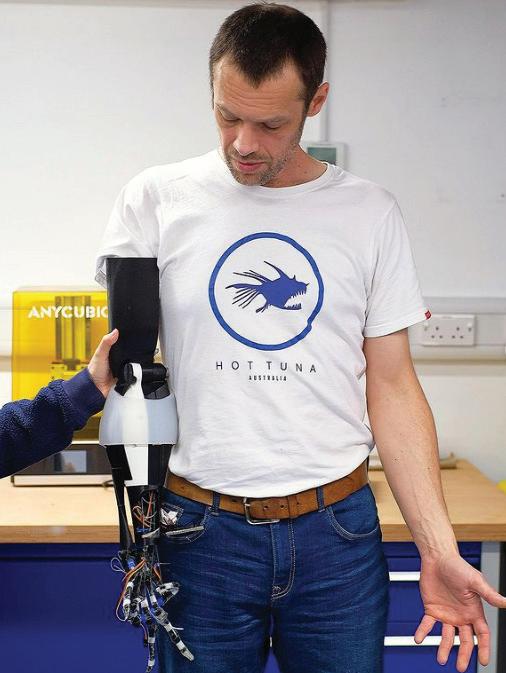
Students from Sheffield Bionics Society have been working with real-world client, Mark Whitehead, to create a bespoke prosthetic arm. The group have worked closely with Mark to produce a working prototype that will eventually lead to a prosthetic suitable for everyday use. Thanks to a recent grant funded by alumni donations, the society is now in a position to purchase a 2024 entry to the prestigious Cybathlon competition. Teams from all over the world will compete to develop assistive technologies with and for people with disabilities. The society hopes this entry will attract new members, as they continue to discover the benefits and limitations of their biomimetic design and how it can be improved to meet Mark’s needs.
“Helping to improve access to effective and affordable bionic devices is very rewarding, both personally and professionally. We’d like to thank everyone who’s donated to help Sheffield Bionics pursue our ambitious goals.”
Bethan O’Malley, Bionics Society PresidentBIG WALK. BIG HEART. BIG THANKS.
On the last Friday in June, over 300 people set off on a hike through the Peak District National Park. Little did they know, they’d return having made the Big Walk 2022 a poignant moment for Sheffield.
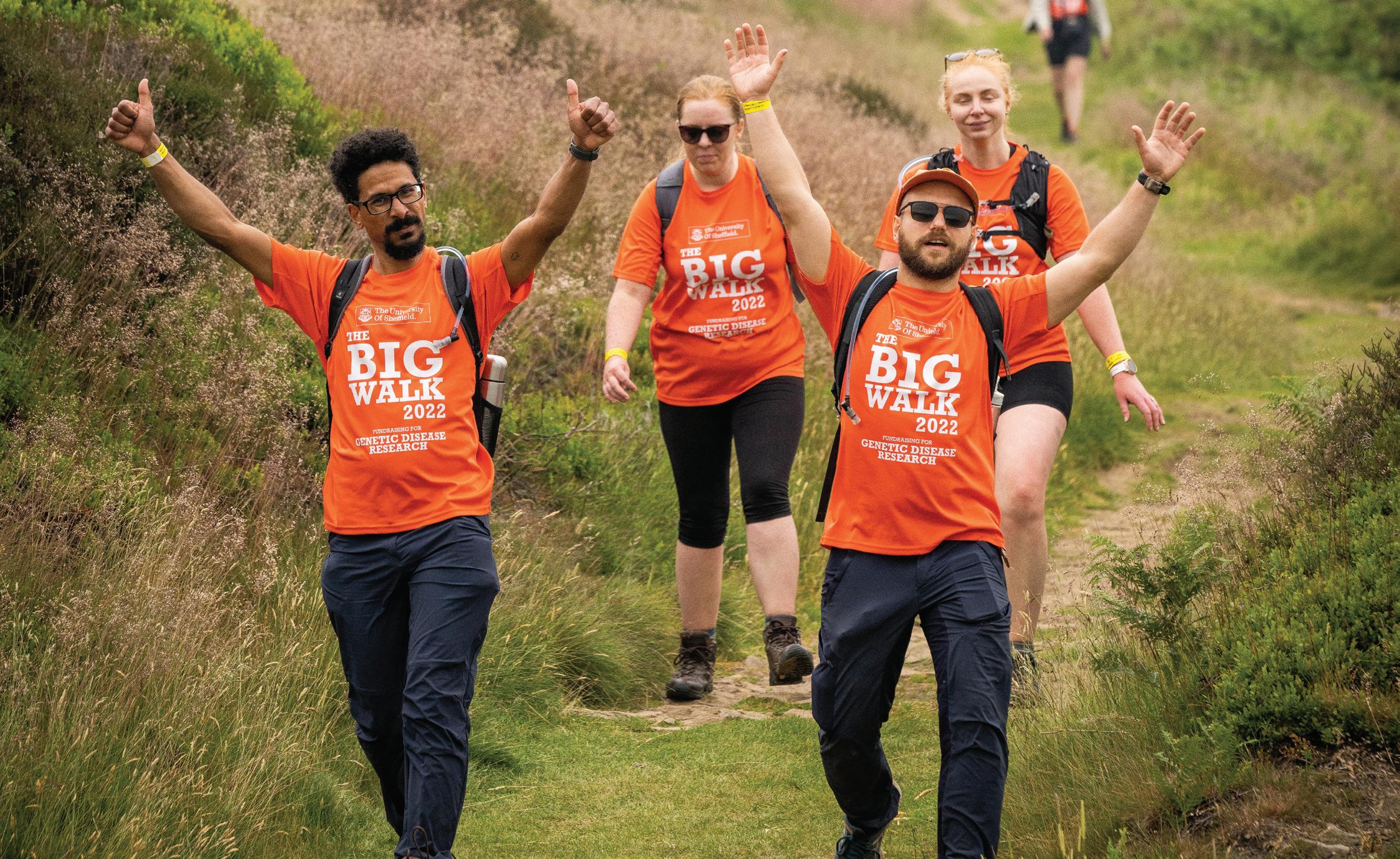
After a two year hiatus, itchy feet were prompting questions about Sheffield’s flagship fundraising event. When would the Big Walk return? Which part of the Peak District would it cover? How many miles? What would walkers fundraise for?
After raising tens of thousands of pounds in the years before the pandemic - for medical research and scholarships for low-income students - our Sheffield community was ready for more. And so were plenty of others who were yet to realise exactly what we mean by a Big Walk.
The proposition is simple. Challenge yourself to walk a significant distance in a day. Put your mind and body through intense pressure but power on through to the finish line. Take pride in your achievement. Do this, and ask your friends and family to sponsor you in aid of a good cause.
This year, Big Walkers fundraised for the University’s Genetic Disease Research appeal, created to raise vital funds for the new Gene Therapy Innovation and Manufacturing Centre (GTIMC) based in Sheffield. The appeal brought together countless personal stories from patients and families living with severe genetic diseases. And it was these individuals who provided such tremendous inspiration for this year’s event.
For research lead Professor Mimoun Azzouz and his team, gene therapy is at a pivotal moment.
With multiple research projects on the horizon, past successes (such as the recently discovered treatment for babies with Spinal Muscular Atrophy) are paving the way for other conditions. Sharing Sheffield’s ground-breaking work with the world means so much to the research team, who were more than happy to take on the challenge themselves!
On the day, walkers chose either a 30km or 50km route that saw the two groups join together midway. The routes covered some of the best and most dramatic scenery of the Peak District. Such as the summit of Mam Tor, the vista over Ladybower Reservoir and the striking rock formations at Bamford Edge.
The event attracted more than 100 volunteers, with many marshalling the route and providing much needed sustenance and encouragement to the walkers. Reflecting on the event, Professor Hugo Dobson, Faculty Director, said “I just want to thank everyone involved. It was such a brilliant day and I had great fun volunteering. Especially in the company of such wonderful colleagues, students and alumni.”
Collectively, the walkers travelled ten times the length of the UK, climbed the height of 40 Mount Everests and raised an incredible £82,350.
Speaking directly to those who took part, Professor Azzouz has said “I can’t express enough the thanks and gratitude we feel towards everyone who’s supported the Genetic Disease Research appeal. Taking on the Big Walk myself, I know it was no easy task! But speaking to walkers along the route it was clear they realised the strain we felt was nothing compared to the pain and heartache of the families affected by these conditions.”
At the finish line, the atmosphere was emotional. The pride of every single person shone through in their smiles and their applause, as walkers crossed the line. After so many months apart, it was clear the Big Walk 2022 was a moment of reconnection for our University community.
Thank you to everyone who made it such a successful and memorable day.
With 1 in 25 babies born in the UK diagnosed with life-limiting genetic diseases, and genes playing such a decisive role in our health as adults, the GTIMC is set to change the landscape of gene therapy in the UK forever. By accelerating clinical trials for rare conditions such as SPG47 and COL4A1, in addition to those more common, such as motor neurone disease and dementia, manufacturing treatments will eventually become secondnature for Sheffield.
Why I took on the Big Walk
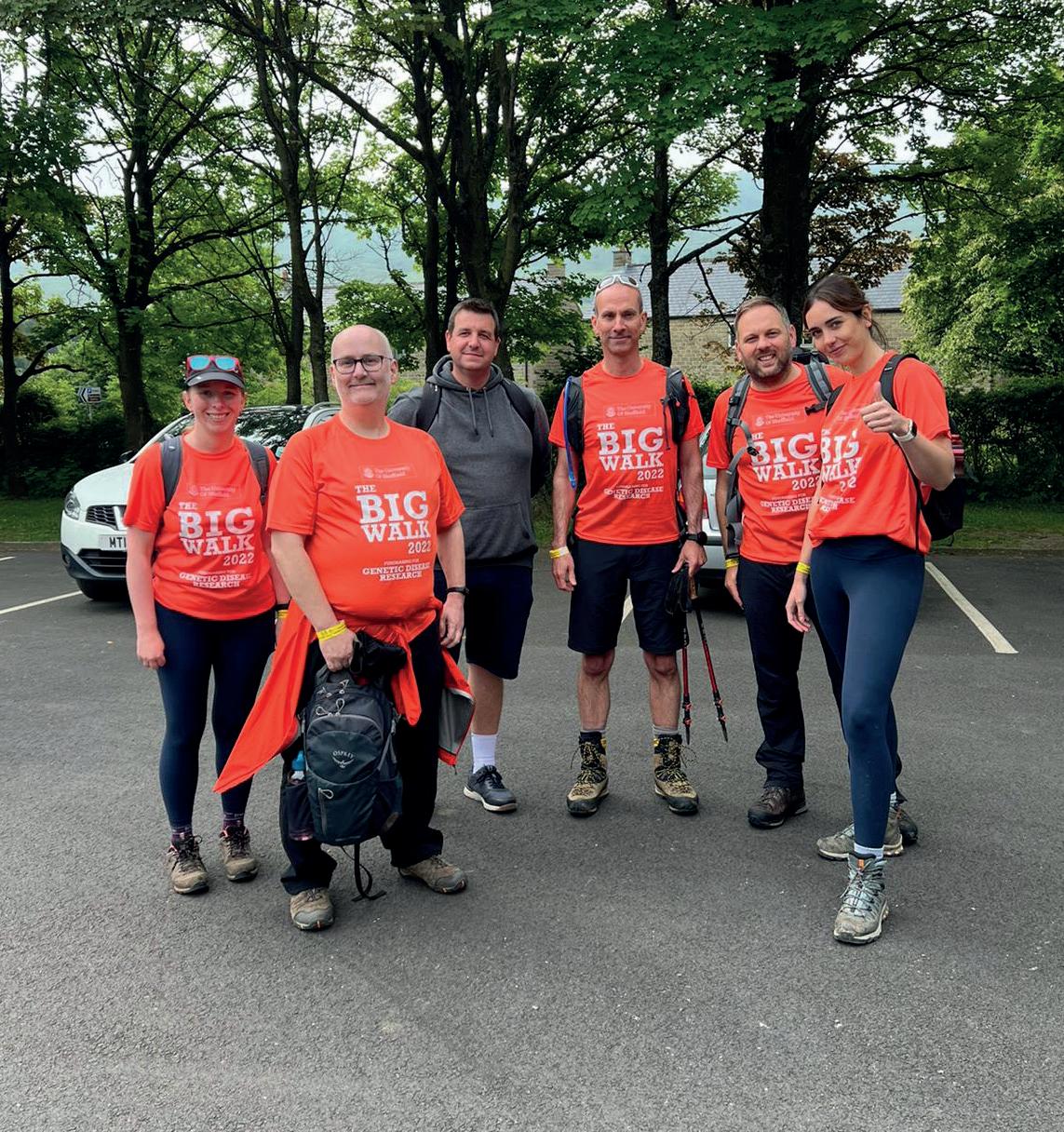
“The countryside was glorious and challenging. The volunteers, friendly and engaging. Our team bonded, we supported a great cause and all felt such a sense of pride in what we achieved.”
James Tringham, Big Walk 2022 participant, Aviva Team
MAKING SPACE FOR THE NEXT GENERATION OF CREATIVE THINKERS
An ambitious programme from the School of Education, supported by your donations, is helping schools, libraries, museums and other community settings introduce makerspaces to children across the UK.
A makerspace is exactly what it sounds like - a space for making. A space that provides opportunities to tinker and create using a range of hi and low tech methods, materials and tools. Makerspaces encourage children to not only develop the knowledge and skills to create, make and mend things, but they also support the development of 21st century transferable skills such as creativity and critical thinking by nurturing a maker mindset.
Sheffield’s Maker{Futures} programme was launched in early 2020 as a long term initiative to support schools, libraries, museums and community groups to develop makerspaces for children. Partly funded by the generous donations of alumni, Maker{Futures} aims to support the growing international movement of maker education.
Maker{Futures} supports educational leaders to set up makerspaces or run maker sessions in a range of spaces. The scheme provides playful and creative ways to develop digital and STEM skills through a STEAM approach that integrates science, technology, engineering and mathematics with the arts.
Led by Programme Director, Dr Alison Buxton, Maker{Futures} is made up of a number of different strands. The Maker{Move} arm of the programme uses a mobile makerspace that brings making events and opportunities to schools and the general public. The Maker{Move} team arrive in the van, unload their wheel-able activity pods and set-up for the day ahead. The pods carry all the resources needed and also transform into maker stations for the activities. Activities for the workshops are chosen depending on learning
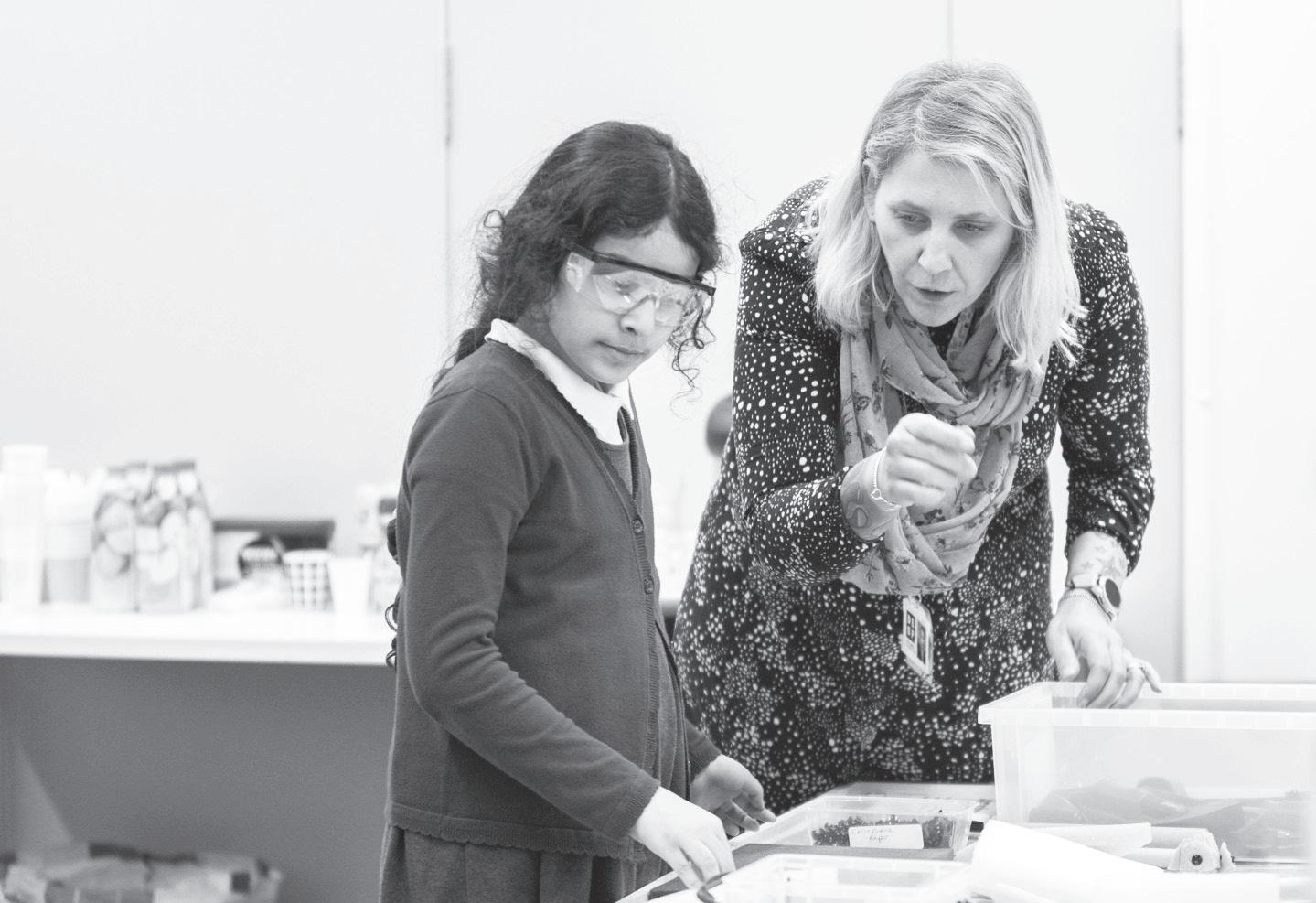
WORKSHOPS
CHILDREN ENGAGED
level and ability. The focus is on making without striving for a specific goal. The process of creating, tinkering, testing and modifying allows children to develop the skills they need to solve complex problems.
The scheme’s Think Like an Engineer programme provides opportunities for schools to take part in engineering-based classroom projects. Volunteer engineers support the students, representing different engineering disciplines, including product design, digital, civil, mechanical and environmental engineering. The projects include Light up Sparklers (Electronics Engineering), Float your Boat (Materials Engineering), Plane Launchers (Aerospace Engineering) and Mighty Microbes (Bioengineering).
More recently, Maker{Futures} has been developing Maker{School}. An initiative focused on providing support for primary schools across the UK. This includes resources and guidance on how to develop makerspaces in the school setting using curriculum resources and teacher development opportunities.
The Make a Maker{School} project, part funded by the Garfield Weston Foundation, has kick-started Maker{School} by partnering with Arbourthorne Community Primary School in Sheffield. Forty five teachers, assistants and pastoral staff took part in a suite of training workshops. The teachers were able to share project ideas that were then developed collaboratively to form part of the programme.
SCHOOLS
TEACHERS, MUSEUMS AND LIBRARY EDUCATORS TRAINED
This collaboration with Arbourthorne has been so successful that a longer lasting partnership has been formed with the school.
“We had an amazing day and all the staff and children left feeling inspired. It was fantastic to see children having complete freedom to explore, play and create. We definitely want to increase the opportunities for children to learn in this way.”
Amy Scrimgeour, TeacherWhat’s more, Make a Maker{School} has been rolled out to nine other schools as exciting plans are developing to create a longer term programme of support. Including a Maker{School} Leaders course and quality mark scheme that will be available nationally. The relationship with the participating schools will continue and plans are already in place to provide additional maker training for some of these schools next year. Whilst others have already signed up for new projects and opportunities with Maker{Futures} throughout 2022 and beyond.
Do you know someone who works with children? To discover training, resources and more visit the Maker{Futures} website or scan the QR code with a smartphone. sites.google.com/sheffield.ac.uk/ makerfutures
REFLECTIONS. FROM ONE DONOR TO
ANOTHER.
I came to Sheffield in 1973 to study Economic and Social History. I was interested in the Industrial Revolution and knew the University was strong on that. Of course, it’s perfectly situated. You only have to go into Derbyshire to see the origins of industry.
Looking back, I did that thing that young people do, always going to the next thing without really thinking. I graduated and left Sheffield for London, but struggled to find a job. My dad was a manager with the postal service. He wanted me to be a civil servant. I applied but failed the entrance exam.
I eventually got a job in a law firm by pretending to know about computers. But several of my friends were working in advertising and they seemed to be living a great life. So I started to look for a new path. I took a pay cut and worked for an advertising firm for about five years. And then, I left to work for an agency called Saatchi and Saatchi. That was 1984. By 1990 I was Managing Director in the UK. And after that I went to Asia as CEO.
But everything comes to an end. I think I was on a jumbo jet every three or four days. I was burnt out. I didn’t want the corporate lifestyle anymore.
I moved to New Zealand and I started to reflect.
Looking back, the lasting friendships I made in Sheffield were just as important as my degree. These people, the experiences we had together, they’ve helped shape me. Helped me to remember what University was like then and consider what it’s like today.
In our final year we lived on the Manor Park estate. For those who know, it’s one of the more deprived areas of Sheffield - even today. But my memories of that time are good. The people were kind and friendly. They had a great sense of identity. They worked hard. Yet without fair access to education, opportunities dwindle. In my eyes, education is about the only thing that changes the world. But I grew up in a Britain where education was free. Things are a lot different today.
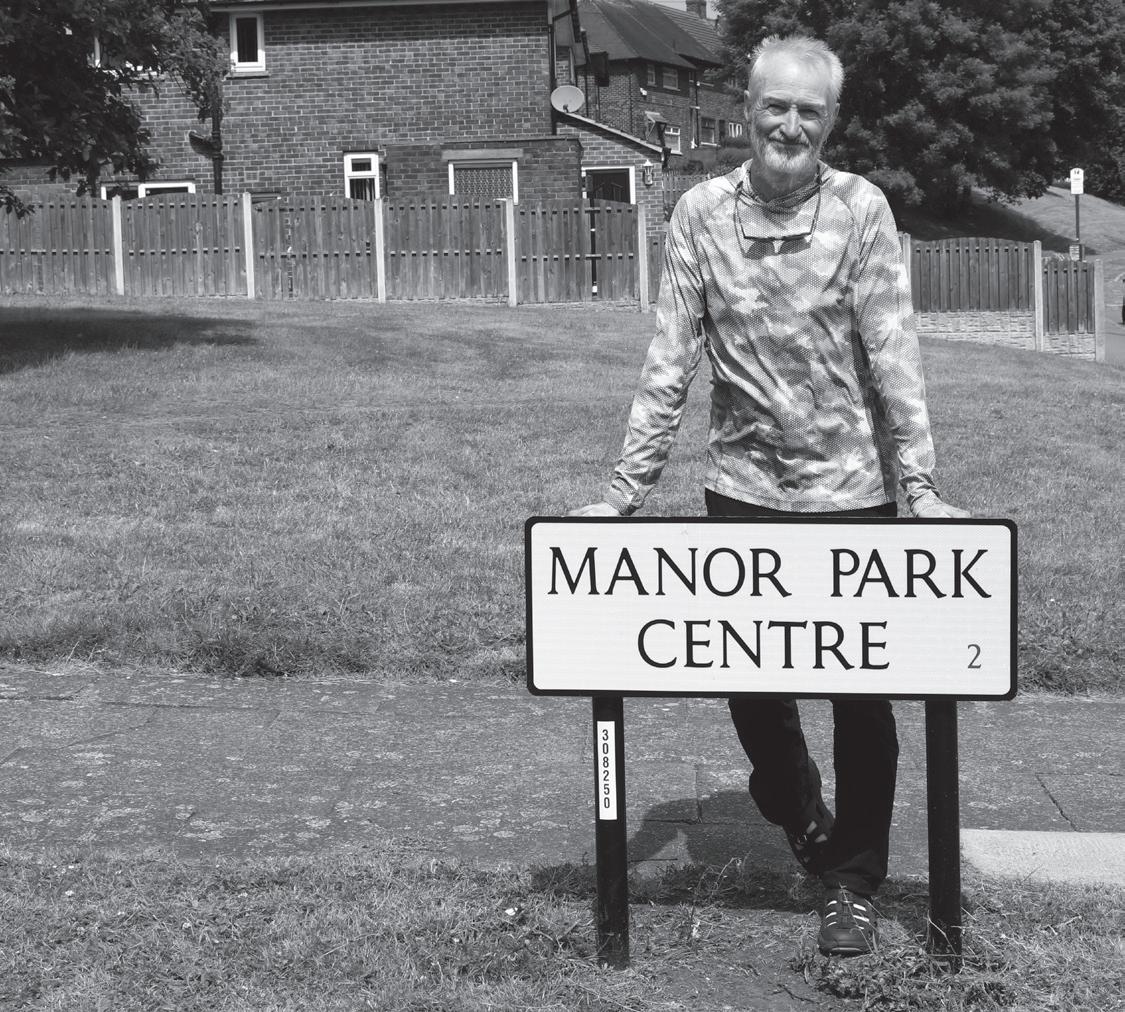
Supporting scholarships has been an eyeopener. I’ve met the students the Manor Park Scholarship supports. Such as a single mum from a disadvantaged area. Meeting her made me realise, this is absolutely what it’s all about. Seeing that she has what it takes to improve her life, for herself and her kids - it brings it alive.
In my view, if you got a leg up as a result of a degree, there’s a certain amount of responsibility in giving somebody else a leg up too. Because then we all grow. It’s all part of raising the bar in education terms.
Today, we know there’s a lot more to learn from university than just the course. It’s not necessarily about being clever. It’s about being better, wiser, and more tolerant. University is part of our own personal growth and changing adventure. It’s an experience that should be open to anyone who is willing and capable.
Pete Watkins, BA Economics and Social History 1976
The Moments That Make Us
Sheffield scholars share their proudest moments.
When I found out I passed my Media Law exams. I cried so many happy tears! I’d worked so hard and revised so much. I couldn’t believe I’d managed to pass first time.
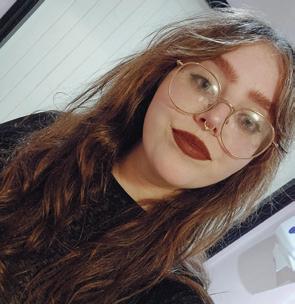
Lucy Edwards, Journalism MA, Sheffield Postgraduate Scholarship
Being part of Diversity Champions, who promote equality, awareness and inclusion within the University. This year, we hosted a guest speaker who spoke to students and staff about autism and how institutions can better support neurodivergent people. It was incredibly insightful and highlighted how lack of support for the autism community, greatly impacts their ability to thrive in schools and the workplace.
Valentia Adarkwa-Afari, English Literature MA, John Turner Scholarship
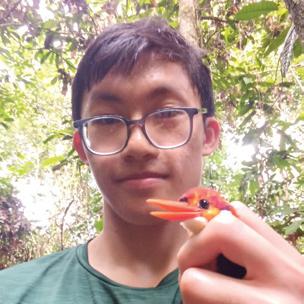
Making it out to Borneo to work as a researcher. Conducting globally-valuable scientific research in the only untouched tropical forest in southeast Asia. Seeing amazing animals and witnessing my course come to life in front of me.
Zachary Chu, Zoology MBiolSci, Denise Coates Scholarship
My proudest moment has to be my dissertation. I put in so much effort and surpassed my expectations. I was faced with several storms along the way, but I endured. Some people begin postgraduate school but aren’t able to see it through due to financial, physical or emotional stress. I’m extremely proud of myself for finishing what I started.
Onome Etim, International Development MPH, Allan and Nesta Ferguson Scholarship
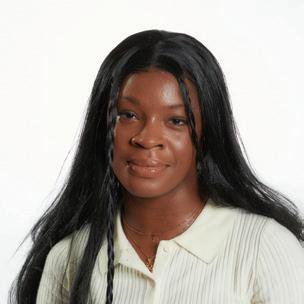
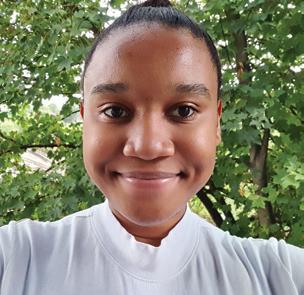
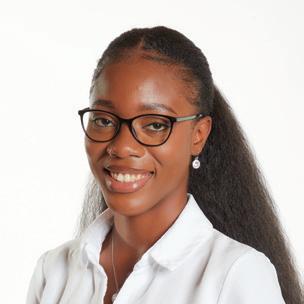
Learning how to use a liquid handling robot called Hamilton Star. It was fascinating and knowing how to program the software has strengthened my problem solving skills. I now understand how to use the robot to run drug screening experiments which is a highlyvalued skill in the field.
Hafsah Omar, Genomic Approaches to Drug Discovery MSc, Rob Pulford Scholarship
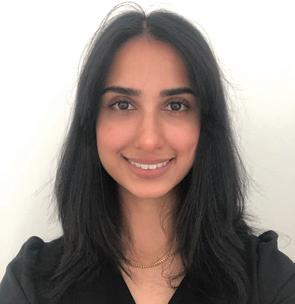
Engaging with real patients in the public, listening to their problems and applying my knowledge. For the first time it really feels like I’m moving away from ordinary education and finally using what I’ve learnt in the real world.
Charlie Butcher, Medicine, Law Family Scholarship
Securing a placement at an international law firm on their first-steps programme. It took place over a week in their London office. My team and I were winners of their diversity and inclusion competition. As a result of taking part, I’ve been fast-tracked to a 2024 vacation scheme. Taking part in this programme showed me that I can succeed in a work environment and that this is only the beginning of my legal career.
India Chung, Law LLB, Experience Sheffield Scholarship
Thank you to everyone who supports scholarships for low-income students. This year 322 new scholars join the University, eager to make themselves proud. Your generosity is helping them every step of the way.
Career Confidence
Every year, hundreds of Sheffield alumni give up their time to support our students. Why? Because pursuing your dream career isn’t as simple as just passing exams.

The inside knowledge and sage advice of those who have gone before us is invaluable. For new graduates, knowing what to include in a CV, where to look for jobs and how to stand-out at interview instils confidence. Meeting graduates who’ve recently tackled the unknown world of post-education makes a huge difference. But when Sheffield alumni live and work all over the world, helping them connect with students means thinking creatively.
Coach Cafe launched in 2021. With philanthropic support from the Law Family Charitable Foundation, the scheme set out to offer virtual networking events to students across all five faculties. It created the chance for students to meet
graduates doing the jobs they want, find out how they got there and ask them what it’s really like.
Previous in-person networking events proved to be highly beneficial to students, but relied on alumni volunteers travelling to campus and were limited to smaller numbers. Coach Cafe set out to overcome this challenge and scale things up. With each session loosely themed by profession, up to 25 alumni at a time log on to a virtual meeting with up to 100 current students.
What follows is a facilitated networking opportunity, where the alumni volunteers talk about their careers and students can ask questions. It sounds simple. But sometimes it’s the simplest of
ideas that have the biggest impact. After one session, almost 97% of student attendees said they had a better understanding of what career roles interested them. 80% said they felt more confident in their career prospects as a result.
Over the course of the year, hundreds of students have participated in the scheme. More than half of the students involved are from demographics that are traditionally less likely to go to university and are often under-represented in many industries. Following the events, students can connect with alumni on LinkedIn, expanding their virtual networks at a crucial time. Coach Cafe is an initiative that’s helping break down the barriers between university and the world of work.
“I now know what I want to do. And having spoken to people doing that career, I feel like it’s actually something I’ll be able to attain!”
Natalie Fenn, BA English Literature
Representation matters. Seeing yourself in those who’ve taken the path ahead of you is powerful. For students from under-representated groups and those who are the first in their family to go to university, meeting others like them proves their dreams are possible. And this is what lies at the heart of alumni volunteering. Showing others that if you’ve got what it takes, so have they.
It’s not only the students who have found Coach Cafe meaningful. The alumni volunteers themselves have taken insight from the experience as well. With many of them at an early to mid stage in their careers, the opportunity to mentor others and reflect on their success is an added benefit. Not to mention the satisfaction of giving back to those following in their footsteps.
Coach Cafe sits within a suite of initiatives that make up the alumni volunteering programme. Over the last ten years, the University has worked closely with its most passionate alumni to create enjoyable volunteering opportunities that have a real impact for
“It was a real privilege to be involved in Coach Cafe and share my career experience since leaving the university. The students were really engaged and I’d definitely recommend other alumni to get involved! I wouldn’t be where I am today without my time at Sheffield so it was an honour to pay it back as an alumni volunteer.”
Ashleigh Randall, MSc Data Analytics 2017
students. The programme hasn’t gone completely virtual. In-person events are still essential, and this year has seen a welcome-return to many programmes such as City Connections and Engineering: You’re Hired. But if the last two years have taught us anything, it’s that connecting virtually has a role to play and is here to stay.
If you’re interested in supporting students as an alumni volunteer, you can find current opportunities on our website at sheffield.ac.uk/alumni/volunteer
2021/22 - A Record Year for Volunteering
This year has seen more volunteers give more hours than ever before.
Thank you to everyone who has taken part in the programme. Your time and expertise is a treasured gift to Sheffield.
Future experts: motor neurone disease
Neurological disorders, such as motor neurone disease (MND), remain the world’s leading cause of disability, devastating the lives of patients and their families. Thanks to the generous support of our donor community, opportunities for Sheffield’s brightest minds are helping pave the way for new treatments.
After completing his PhD at Sheffield’s Institute for Translational Neuroscience (SITraN), Dr Tobi Moll was awarded the Kingsland Postdoctoral Fellowship. Established in 2019 and funded by a generous corporate donation, the Fellowship supports an outstanding Postdoctoral Fellow at SITraN to lead new MND research.
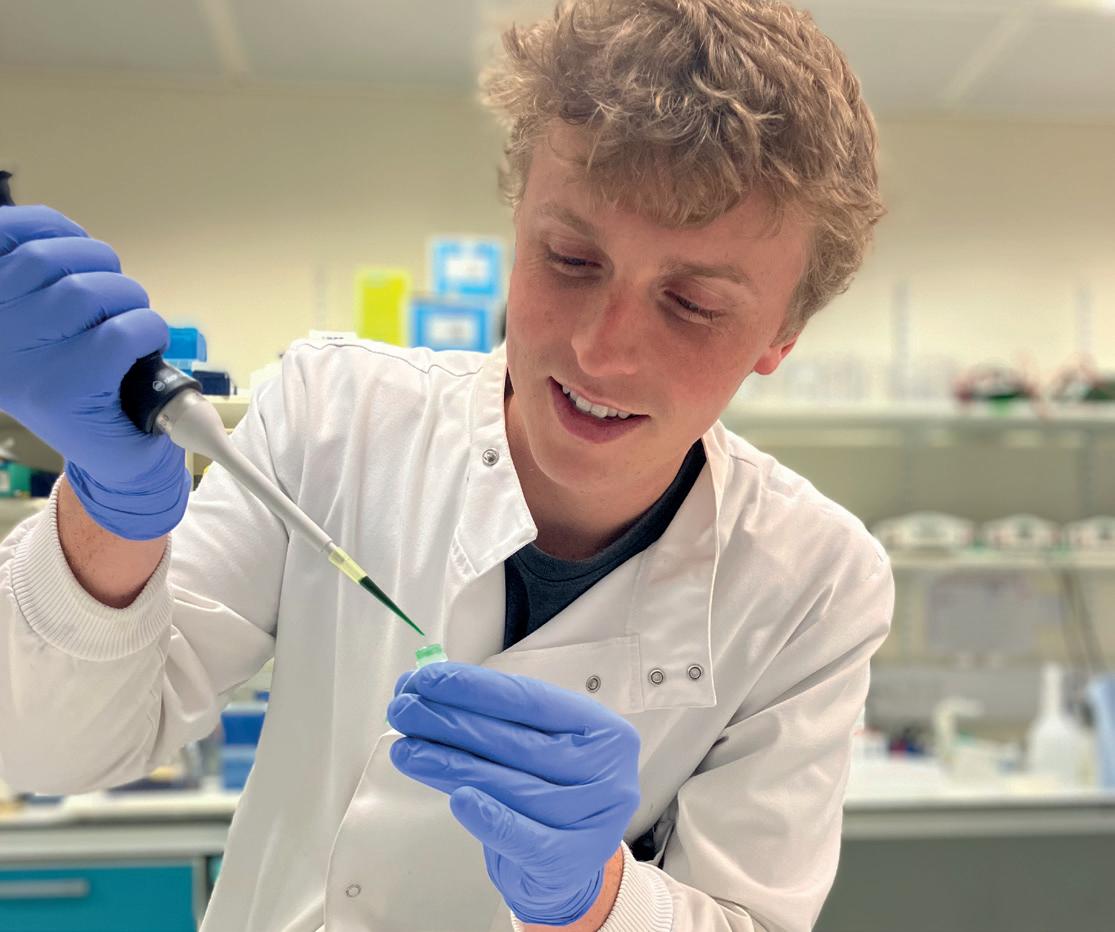
MND is a disorder that affects the nerves - or motor neurones - in the brain and spinal cord that enable movement. The messages from these nerves gradually stop reaching the muscles, leading them to weaken, stiffen and eventually waste. The progressive disease affects a patient’s ability to walk, talk, use their arms and hands, eat and breathe.
Working alongside Dr Johnathan Cooper-Knock, Tobi helped identify three new genetic variants associated with MND. Using CRISPR – a ground-breaking gene editing tool – Tobi altered DNA sequences and modified gene function in motor neurone cells to see the effect of new genetic variants. This research is uncovering important clues as to how motor neurones are damaged and provides a starting point for the development of new treatments.
“The Kingsland Postdoctoral Fellowship has been instrumental to my development as a research scientist. More importantly, it’s supporting our mission to understand new MND biology and pave the way for the development of new therapies for patients; for this I am extremely grateful.”
Dr Tobi Moll, Kingsland Postdoctoral FellowSITraN is the ideal environment in which to carry out this research. Its advanced expertise in growing motor neurones from skin cells in the lab is at the forefront of scientific technology. Matched with its proficiency and success in running clinical trials, SITraN attracts some of the most talented researchers in the world. Originally funded by philanthropy, SITraN continues to inspire donations from those who see the huge potential in its work. For people like Shaun Dixon, Founder and Chairman of Kingsland Wealth Management, who fund Tobi’s Postdoctoral Fellowship, seeing the impact of the research is particularly important.
“We’re very proud to support SITraN and see the extraordinary research and dedication of the staff there. We know our gift is making a difference by helping to find new treatments for a devastating condition.”
Shaun Dixon, Founder and Chairman of Kingsland Wealth ManagementEvery year hundreds of individuals, corporations and charitable foundations make donations to Sheffield research. Lives will be forever changed and saved thanks to your support. Thank you.
A LEGACY
SHARED
If you’ve ever met Dave Meadows or been on one of his legendary campus tours, you’ll know his passion for Sheffield is infectious. Here Dave shares his story and tells us how he’s helping fellow alumni, staff and friends of Sheffield make their mark on the University.
Where are you from and why did you come to Sheffield?
I’m from Sale in Manchester. I was the first person in my family to attend University so I was nervous about it. But after an open day, Sheffield was my top choice. When I arrived, I was in awe of all the opportunities available to me! My Business Studies teachers were fantastic and I was able to take part in a leadership course and even travel to the USA.
Why did you decide to take a role working for the
University?
As a student, I needed to find part-time work. I got a job on the first ever student fundraising calling campaign and enjoyed every minute. After graduating, I was over the moon to secure a full-time position in the alumni office. Almost 20 years on, I still feel immense pride in representing the University! And I know that’s a feeling other graduates share too. Having spoken to hundreds of people with a connection to Sheffield, the common theme is definitely the sense of community. It’s what makes this University so special.
Why do you think people choose to leave gifts in their Wills to the University?
The main reason is they have a passion for education. Universities are opening doors for students from all backgrounds and finding answers to the world’s most pressing problems. This creates a plethora of philanthropic opportunities. Often people want to donate to say thank you for the opportunities they had as a result of university. Others want to help progress research that will one day improve lives. But there is another reason. Universities give people the chance to leave a legacy in their name. So sometimes it’s simply because they want to be remembered.
How does it make you feel when you see a legacy gift have an impact?
It makes me proud to see a gift fulfilled and benefit the area the donor intended. I also take personal responsibility for ensuring unrestricted gifts help the University’s priorities as well as aligning with the donor’s interests too. I work hard to find out about the donor. For me, it’s a mark of respect and it’s what makes my job so fascinating. Sheffield alumni and their families are incredibly inspiring people!
As a legacy pledger yourself, what does your legacy gift mean to you?
I can’t afford to leave a huge legacy but should the worst happen, together with my wife, we’ve left gifts to the charities that mean the most to us. Leaving a gift lays a foundation to our children to let them know what causes were important to us during our lifetimes. I have a passion for sport and I know that modest gifts can benefit student clubs and societies, helping them to welcome new members and represent Sheffield nationally, and even internationally. I’d be overjoyed to see my legacy gift used in this way.
Is there anything you’d like to say to those who are planning a legacy gift to the University?
Just a huge thank you. You’re going to make such a difference. The University of Sheffield is already a worldclass institution. But thanks to people like you, it’s sure to hold on to that reputation long after we’ve all gone.
Dave Meadows is Senior Philanthropy Manager (Legacies). You can get in touch with Dave on 0114 222 1073 or d.meadows@sheffield.ac.uk.

